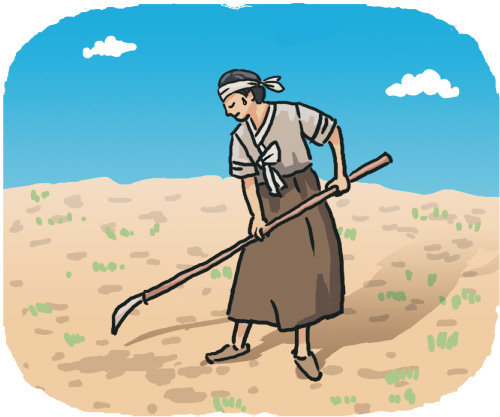Girls plowing the fields
Girls plowing the fields
Posted October. 05, 2022 07:35,
Updated October. 05, 2022 07:35

‘Girls Plowing the Fields’ by Tang Dynasty poet Dai Shulun is a portrayal of women working in the fields. Two daughters from a poor family are plowing and planting crops with knives. They cover their faces with a bandana scarf to hide their faces. “My brother, who has never been married, joined the military/ Last year, a livestock plague swept the village and killed the cattle/ So knives have taken the place of cattle.” The poet thought it was heartbreaking to hear. Additionally, "pheasants looking for a mate/make the hearts of two old maids having lunch on the hill in the middle of the day flutter.”
Pak Je-ga, who wrote “Discourse on Northern Learning,” paid attention to this poem to convey a message. He referred to this poem in his 1798 article, “Discourse on Northern Learning to His Highness,” and talked about the reality of women working in the fields. Still, Chinese women had no choice but to work in the fields because of the Lushan Rebellion. The Lushan Rebellion led to the conscription of men into battlefields, so there were only women in the house to engage in strenuous manual labor. However, this was not the case in Korea.
The last hundred years have been a time of peace. The problem was the scholars who were supposedly studying to prepare for the civil service exam but were not helping around the house. Their number exceeded 100,000. Neither their father nor brother worked in the fields. “It has now been a hundred years since this group of people accounted for most of the population.” In the rice paddies were peasants who worked as servants, scholars’ wives, and children. Most of the work of feeding cattle, plowing, mowing, and milling was done by the women in the inner quarters. As a result, in some villages, the beating sound of a fulling mallet could not be heard, which meant that some had nothing to do or cover their bodies with. This was a sad reality.
Pak spoke to the king with candor, saying he was afraid that others would find out about this embarrassing situation. “Scholars are to blame the most about failing harvest,” so cull them. However, Jeongjo passed away two years later. Looking back, it's a tragic history, but the fact that there was someone who told the king the hard truth is comforting, albeit a little.







